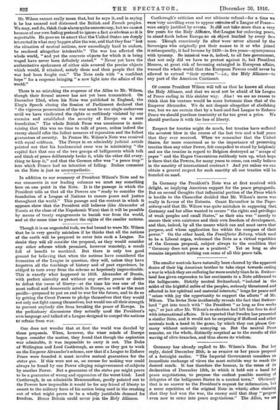One does not wonder that at first the world was
dazzled by these proposals. When, however, the wiser minds of Europe began consider the matter, they found that though the aspiration was admirable, it was impossible to carry it out. The Duke of- Wellington and Lord Castlereagh, as soon as they got to work on the Emperor Alexander's scheme, saw that if a League to Enforce Peace were founded it must involve mutual guarantees for the status quo. If this were not so, an excuse for making war could always be found by one Power alleging misgovernment of subjects by another Power. But a guarantee of the status quo might prove to be a guarantee of wrong and oppression of the worst kind. Lord Castlereagh, in an admirable Memorandum, gently pointed out to the Powers how impossible it would be for any friend of liberty to assent to the military force of his nation being used in the crushing out of what might prove to be a wholly justifiable demand for freedom. Hence Britain could never join the Holy Alliance Castlereagh's criticism and our ultimate refusal—for a time we were very unwilling even to appear miemies of a League of Peace— were amply justified by events. It -did not take- more than a very few years for the Holy All e, theeLeague for enforcing peace, to stand-forth before Europeans an object loathed by every free man. Though consciously its erne were never altered by the Sovereigns who originally put their names to it or who joined it sebsequently, it had become by 1820—in five years—synonymous with tyranny. So inimical was-it, indeed, to all five-government, that not only did we have to protest against it;• but Piesident Monroe, at great risk of becoming entangled in European affairs, Warned the whole world that the European Powers could never be allowed to extend " their system "—i.e., the Hely Alliance—to any part of the Ainerican Continent,.


























 Previous page
Previous page